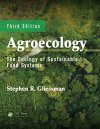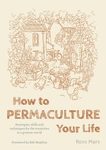![Agroecology: The Ecology of Sustainable Food Systems Agroecology: The Ecology of Sustainable Food Systems]()
Click to have a closer look
About this book
Contents
Related titles
Recommended titles
About this book
Providing the theoretical and conceptual framework for this continually evolving field, Agroecology: The Ecology of Sustainable Food Systems, Second Edition explores environmental factors and complexities affecting agricultural crops and animals. Completely revised, updated, and reworked, the second edition contains new data, new readings, new issues and case studies, and new options. It includes two completely new chapters, one on the role of livestock animals in agroecosystems and one on the cultural and community aspects of sustainable food systems.
The author clearly delineates the importance of using an ecosystem framework for determining if a particular agricultural practice, input, or management decision contributes or detracts from sustainability. He explains how the framework provides the ecological basis for the functioning of the chosen management strategy over the long-term. He also examines system level interactions, stressing the need for understanding the emergent qualities of populations, communities, and ecosystems and their roles in sustainable agriculture. Using examples of farming systems in a broad array of ecological conditions, Agroecology: The Ecology of Sustainable Food Systems demonstrates how to use an ecosystem approach to design and manage agroecosystems for sustainability.
Contents
INTRODUCTION TO AGROECOLOGY
The Need for Sustainable Food Production Systems
The Agroecosystem Concept
PLANTS AND ENVIRONMENTAL FACTORS
The Plant
Light
Temperature
Humidity and Rainfall
Wind
Soil
Water in the Soil
Fire
Biotic Factors
The Environmental Complex
SYSTEM-LEVEL INTERACTIONS
The Population Ecology of Agroecosystems
Genetic Resources in Agroecosystems
Species Interactions in Crop Communities
Agroecosystem Diversity and Stability
Disturbance, Succession, and Agroecosystem Management
The Energetics of Agroecosystems
Animals in Agroecosystems
THE TRANSITION TO SUSTAINABILITY
Converting to Ecologically Based Management
Indicators of Sustainability
Landscape Diversity and Agroecosystem Management
Community, Culture, and Sustainability
From Sustainable Agroecosystems to Sustainable Food Systems
Glossary
Index
Customer Reviews
Out of Print
By: Stephen R Gliessman(Author)
384 pages, plates with colour photos; b/w photos
"[...] very clearly and thoroughly educates the reader in the principles of ecology, while making the case that to approach sustainability, agriculture must be ecologically based. [...] equally valuable to agriculture students whose course of study follows more conventional dogma; graduate students in rural sociology and agricultural economics; and those planning careers dealing with food security, community development, and agricultural policy issues."
– J.C. Mayne, USDA Southern SARE program, University of Georgia, American Journal of Alternative Agriculture, Vol. 15
"It is clear, insightful, well illustrated and referenced, and the 21 chapters contain many useful case studies. It deserves to be in every library, and is a pleasure to read. This is a valuable manual, and vital for all concerned with learning and teaching in agricultural courses. It deserves to be widely used."
– Jules Pretty OBE in Cambridge University Press Vol. 43, 2007
"The author has had extensive international experience in tropical and temperate agriculture, and numerous farming systems. This experience has provided him with a wealth of material that has found its way into this book. The author clearly is an authority in the field of agro-ecology and teaches on the subject. [...] agronomists and biologists, as well as general scholars and people interested by sustainability as an attitude or life style will learn about how to put principles into (cropping and whole
food chain) practice. All in all: a good read!"
– Patrick Van Damme, University of Gent, Belgium, in Economic Botany




































